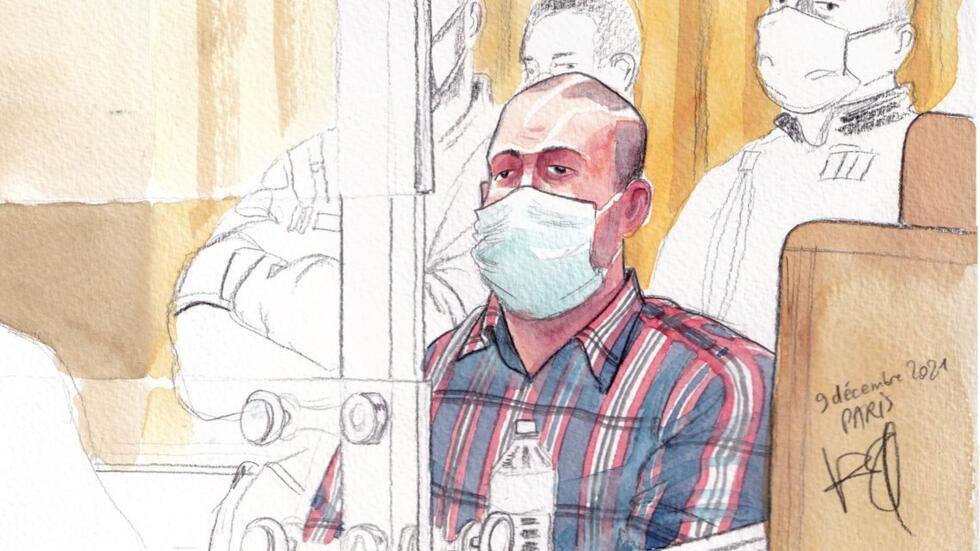Paris attacks accused fails to live up to the glowing image painted by his father, wife
On Friday, it was the turn of Mohammed Amri to testify before the Paris court trying himself and 19 other individuals for their alleged complicity in the November 2015 massacres which cost 131 people their lives. Amri admits that he drove the sole surviving terrorist, Salah Abdeslam, back to Belgium on the morning after the attacks.
Issued on:

Mohammed Amri spoke late in the day. He was inarticulate, frequently truculent, argumentative, incoherent, aggressive. The contrast with the two witnesses who spoke on his behalf was striking. And unfortunate for the accused.
The prisoner's father, Bennasser Amri, was the first to speak by videolink from the federal police building in the Belgian capital, Brussels.
This 66-year-old Moroccan, long established in Belgium, described his son as kind and generous, "a really good person.
"He would take food from the house to give it to someone in need."
The father, an "ordinary, normal Muslim," spoke with contempt of those who supported the murderous ideology of Islamic State in the name of a religion clearly based on peace and generosity.
'A simple, normal form of Islam'
"I don't understand people who blow themselves up to kill the innocent," he told the court.
His son had never shown any signs of radicalisation. "Our attitude to religion was simple, normal, without any problems."
His son's mistake was to have become involved with the Abdeslam brothers, in whose Brussels café, Les Béguines, Mohammed Amri occasionally worked as a server.
"Salah Abdeslam is a killer, an assassin, a criminal," insurged the father at one stage, admitting that he had never met Abdeslam and had learned about him on television. But, he insisted, "my son is not like that".
Salah Abdeslam came to Paris with the nine perpetrators of the November 2015 attacks, but abandoned his explosive vest and took no active part in the killing. He is one of Amri's co-accused in this trial, and sits just inches from him in the prisoners' enclosure.
Abdeslam's brother Brahim was one of the terrace attackers and blew himself up in the Comptoir Voltaire café on 13 November 2015.
It is principally for his part in helping Salah Abdeslam return to Belgium, where he was eventually arrested, that Mohammed Amri is being tried. He is also suspected of having rented a vehicle used by the killers. Amri will go to jail for 20 years if found guilty.
A bright young woman reduced to tears
Then it was the turn of Mohammed Amri's Dutch wife to speak on his behalf. She continues to use her maiden name and asked not to be identified.
This bright, effervescent 31-year-old was rapidly reduced to tears as she spoke of the man she loved.
"If it had been a question of drugs, I wouldn't have been surprised," she said. "He was a serious smoker.
"But religion, this business with radical terrorists, never! That's just not him.
"I told him to avoid Les Béguines. The place had an appalling reputation. It was dark and dirty. Everyone knew it was associated with drugs.
"But he was never interested in jihad or Syria or anything like that."
And then it was the turn of the man himself.
"Before this case, I didn't even know the word radicalisation," he asserted.
"Brahim Abdeslam wasn't radical. He shook hands with women, dressed normally, liked a drink. I didn't know him that well."
'Like the victims, I'm ready to forgive'
On the question of Islamic State propaganda videos which others have confirmed were regularly watched in Les Béguines, the accused was less helpful.
"That was six years ago. I don't know what we watched. I don't remember.
"Is someone who watched IS videos a radical?"
As the evening wore on, Mohammed Amri was asked about his attitude to Salah Abdeslam, sitting just beside him in the box.
"It's because of him that I'm here," the accused replied. "I'm a bit angry about that. But I'm ready to forgive.
"I have heard victims in this court say they are ready to forgive. That touched me."
"So, is he still your friend?"
"It's a bit complicated."
The trial continues.
Daily newsletterReceive essential international news every morning
Subscribe